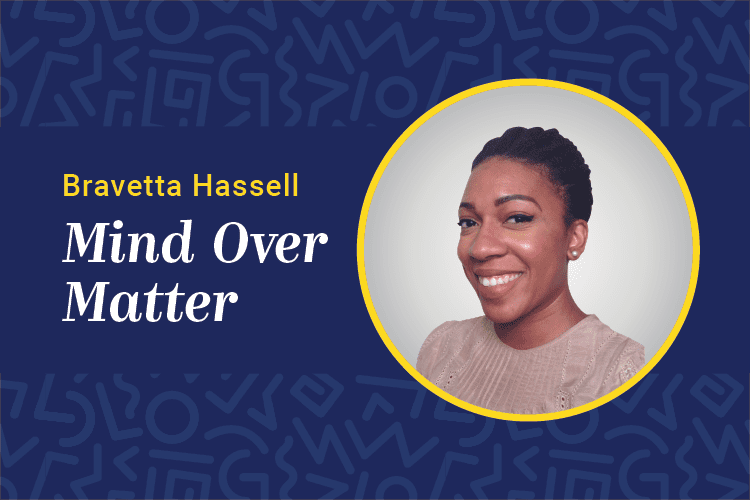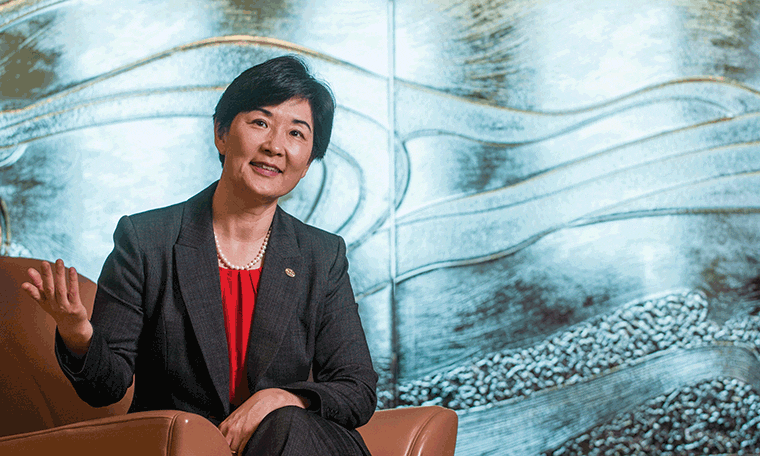 Roz Tsai’s fascination with learning is rooted in her history. She grew up during China’s Cultural Revolution and Mao Zedong’s Communist movement.
Roz Tsai’s fascination with learning is rooted in her history. She grew up during China’s Cultural Revolution and Mao Zedong’s Communist movement.
“My kids grew up in the U.S. They have access to libraries everywhere, and when I was growing up, most libraries were closed for examinations and censorship,” she said, recalling the distance she had to walk to reach a neighborhood bookstore, only to find empty shelves.
Tsai’s father, then a factory worker, befriended a librarian at his job who allowed him access to the factory’s library where he took the thickest book he could find. He brought it home to his daughter, taught her how to use their dictionary, and she learned to read before finally getting to attend school at age 8.
“If you think about the Chinese culture with such a deep, deep reverence for learning and for self-cultivation, having access to learning so limited it probably shaped this hunger in me all my life,” said Tsai, vice president of human resources-enterprise learning at the St. Paul, Minnesota-based Ecolab, a global water, hygiene and energy technologies and services company.
Life has shown her that learning should not be taken for granted. “Being given this opportunity to build a learning infrastructure and provide learning programming — to help people propel their own personal growth and career growth — there’s nothing more fulfilling.”
—
Tsai has been with Ecolab for almost seven years but only recently transitioned to her current role. Prior to it, she oversaw learning strategy and execution for one of the company’s largest global lines, the institutional business that provides clients with products and services like onsite employee training and inspections.
Leadership at the $13.5 billion company has declared its ambition to become the destination for the world’s most capable talent to join Ecolab and propel its growth. “Given the importance of talented associates to our business model and our increasing need for talent to meet our future growth, we developed Destination Ecolab, an integrated talent management approach to enable us to attract the world’s best talent to our organization,” said Anne Gotte, HR vice president of talent and organizational development. Part of this strategy included creating Tsai’s corporate learning officer role to ensure learning and development is a key enabler for the company’s talent ambition.
Employing roughly 47,000 people worldwide and operating in 170 countries, Ecolab, which was founded in 1923, boasts a business portfolio that includes clean water, hygiene, oil and gas, and manufacturing. As such, expectations are high when it comes to the corporate capabilities and leadership strengths needed to deliver against the 2020 vision that includes growing its workforce.
Making Ecolab “the destination for the world’s most capable talent” means becoming a leading employment brand for existing associates as well as prospective employees.
Accordingly, Destination Ecolab comprises four levers that the company’s talent management organization is working on: Amplifying and articulating the employment proposition by telling Ecolab’s story; ensuring that leadership pipelines are strong, purposeful and strategic about building the necessary skills and experiences for the company’s most critical roles; offering diverse career paths and increasing growth opportunities; and promoting learning through a deliberate execution of the 70-20-10 learning model.
That last learning lever has three arms: performance management, career framework and formal learning investment, which Tsai said were identified through an in-depth discovery process with the executive team and the HR global council, which includes Ecolab’s CEO, COO, division presidents, region presidents and other function leaders.
A few key learnings emerged. Many of Ecolab’s senior-level leaders came up through the company ranks, so career paths were a huge talking point. Some leaders mapping out their personal career journeys could look all the way back to their first profit-and-loss management or function leader role at the company, Tsai said. As a result, there was almost 100 percent consensus from leaders advocating the learning function provide a transparent career framework for all associates.
The importance of performance management in business growth and success also bubbled up in the Destination Ecolab discovery process. Executives expressed a need to make sure all leaders become better performance coaches and even better at providing ongoing performance feedback in areas like goal setting, performance review processes, ongoing performance conversations, and tying performance and results to rewards and recognition.
Tsai said the company’s performance culture has helped drive its near-century success in business. When it comes to Destination Ecolab, she wants to advance that story to existing and future employees, that performance has allowed the company to attain such growth. “Ours is a virtuous cycle — with strong performance, the company grows, which provides continued career opportunities for our associates.”
Executives rallying around Destination Ecolab and learning’s key role in it is a testament to the type of support Tsai finds for the work she is so passionate about doing. She said the company’s CEO, Douglas Baker, regularly declares that talent is one of the key drivers for Ecolab’s growth, and he personally encourages managers to make sure they are growing talent and fostering an engaging and inclusive environment.
With a culture led like that, Tsai doesn’t need to ask for executive sponsorship — leaders are practically knocking down her door. It doesn’t hurt that relationship-building is one of the many strengths Tsai brings to her work, Gotte said. “Roz thinks big, builds relevant solutions and activates them through others. It’s amazing to watch.”
Ecolab’s culture is also customer-focused, Tsai said. The organization thrives on its expertise, its in-depth customer relationships and its genuine understanding.
“When we say our customers come first, it means that our associates are well-trained, and they are utilizing their knowledge to solve complex challenges our customers face. If we can help our customers be successful, we will be successful,” she said.
It’s a perspective shared across Ecolab’s learning organization. The function includes more than 20 different learning teams embedded inside the company’s various businesses and regions. This way, learning and development is intimately connected to the employees and customers they serve. More than 200 learning professionals report in to their respective businesses and ultimately to Tsai.
—
Tsai said she never imagined as a little girl that she would one day run a learning strategy for a global enterprise poised to employ 50,000 people.
At Nankai University in Tianjin, China, she majored in English and minored in French. She went to grad school in the United States, earning a master’s degree in library science at St. Cloud State University in St. Cloud, Minnesota. “I could imagine no career more exciting than sitting in the library and having access to all the resources, but there were unintended benefits.”
When she joined the library science program, microcomputers had just come out and the education market was being transformed by new technology. So, while getting her graduate degree, she picked up courses in instructional design and instructional technology and became quite adept at using microcomputers. She later pursued her doctorate in curriculum and instruction from the University of Minnesota-Twin Cities.
“An unplanned journey has its own rewards” is one of the two taglines defining Tsai’s professional journey. The other is “trust your curiosity to guide you,” she said. “Because I didn’t know. Nobody sat down and said here’s your journey to CLO.”
Tsai said she chose an internship at Wilson Learning strictly for career purposes, but she walked away with an understanding of what it meant to apply theory to practice and what disciplined, evidence-based research looked like. She spent about a decade at a software company where she built a learning department from the ground up as the organization prepared its workforce for Y2K. After Tsai spent some time working as a consultant, she was called to be part of learning at Honeywell, a multinational commercial and consumer product conglomerate. That opportunity helped her add value when she joined Ecolab in 2010.
For Tsai, learning is never for the sake of learning. When a learning strategy is executed right, everyone understands not just what their job entails, but its purpose, and in the case of Ecolab, how that purpose fits into the company’s heritage.
“It’s always going to be in the context of the work we need to do today, the work that we need to prepare for tomorrow, and for individual associates, it’s also in the context of, ‘How do I boost my performance in my role today,’ and ‘How do I prepare for future opportunities in my career.’ ”
Tsai said employees often tell her stories about their climb through the organization with learning and development support. “You realize at the end of the day, it’s not me doing the work. I’m the advocate, strategist. I coach our learning leaders and our learning teams, but you see the ripple impact, and it’s powerful.”
—
“Learn, do, give” is how Tsai describes her self-development efforts. She makes studying a daily habit. Lately, she’s been on a behavior economics kick to better understand what drives decision-making and change. She’s also familiar with Ruth Clark’s study of expertise and theory on the amount of practice it takes be an expert, but that’s not what she’s going for. It’s more about observation, watching other leaders organize their lives and articulate their business challenges and solutions.
“To me, nobody has 10,000 hours to stop their life to study. Instead my mantra is, if I make every hour a learning hour, it all counts,” Tsai said. “Every meeting, every presentation, every coaching conversation gives me a moment to think about how did that go, did that go well, why did that go well, and how could I have done better. So, I study.”
Tsai is also a mentor, speaker, coach, and a hands-on doer. Even though she is a chief strategist in role and responsibility, no work is ever beneath her, whether it is data analysis or tactical facilitation. She also teaches training and development courses at the University of St. Thomas, in St. Paul, Minnesota. “I delight in just doing the work because in the process, it makes me better, makes me more confident and makes me faster at everything I do.”
Day-to-day interactions with her father, now 92 and in declining health, also offer learning as Tsai works to grasp how every piece of her life’s journey has conspired to bring her to where she is now. “I think a lot about the things he taught me.”
Zhongzhou Cai grew up during World War II and had no education beyond trade school, but he was determined that Tsai and her brother would experience far more than he had. “He made education available to us kids, encouraged us to pursue education in the U.S. when he could have used our help to care for my mom,” Tsai said. “All of those things kind of shape who I am in terms of purpose on this planet.”
Learning opens up the world and makes one a richer and better person. Meaning can be found in learning every day because every day, Tsai finds, there is more for her to do.
Bravetta Hassell is a Chief Learning Officer associate editor. Comment below, or email editor@CLOmedia.com.












